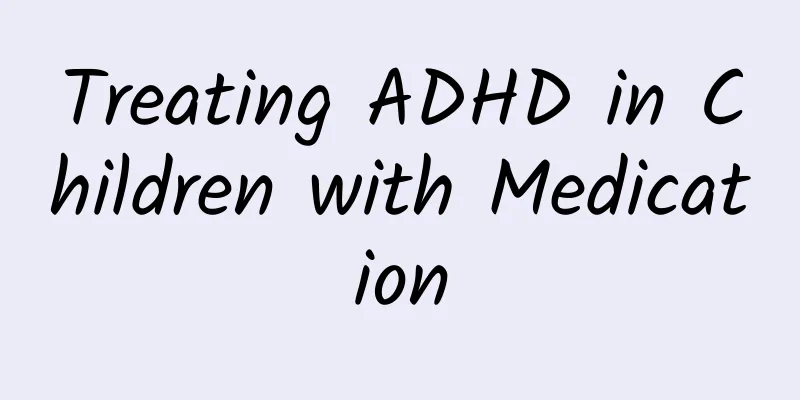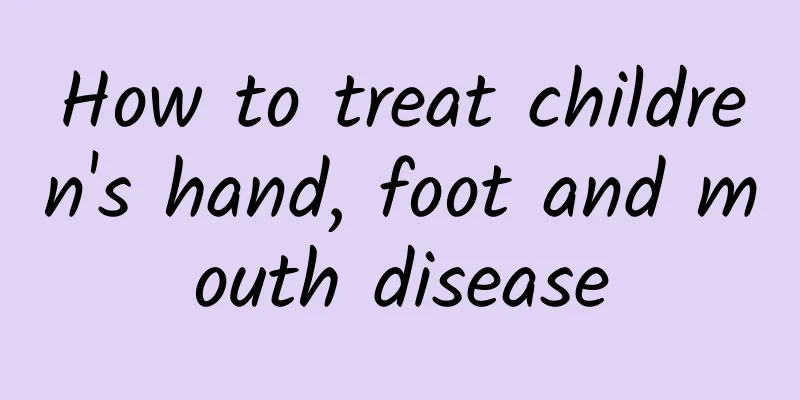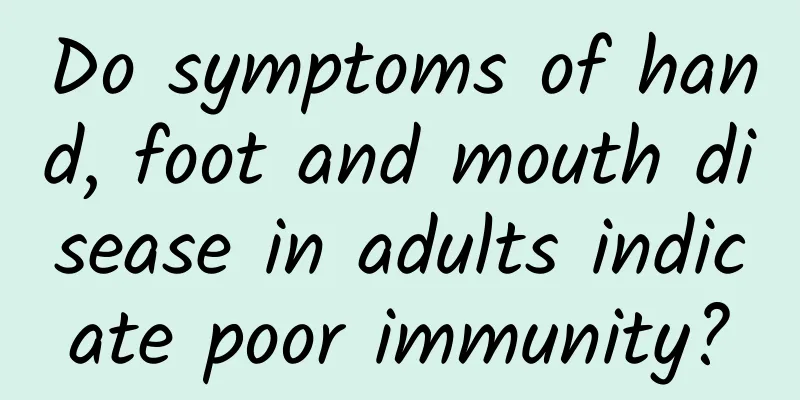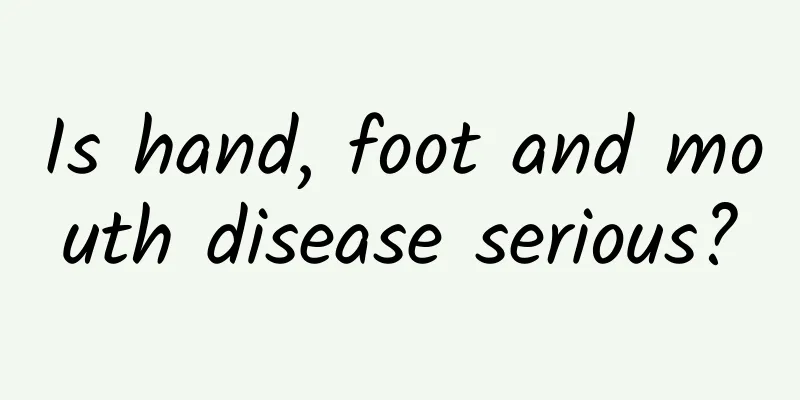What types of hand, foot and mouth disease are there in children? How is it transmitted?

|
Hand, foot and mouth disease in children is a common contagious disease, especially in spring and autumn, which is a high-risk period for the spread of hand, foot and mouth disease in children. Many infants and young children are easily infected by this virus. So, what are the types of hand, foot and mouth disease in children? How is it spread? Let's follow the editor to read the detailed introduction of this article. 1. What is hand, foot and mouth disease? Hand, foot and mouth disease is an acute infectious disease caused by a variety of enteroviruses, mainly Coxsackievirus A group 16, 4, 5, 7, 9, 10, group B group 2, 5, 13, echovirus and enterovirus 71 (EV71), with EV71 and CoxA16 being the main ones. Among them, EV71 is more likely to cause cases to develop into severe illness or even death than other types of viruses. April to October each year is the peak period for hand, foot and mouth disease, which mostly occurs in preschool children, especially children under 3 years old, but children of other ages can also get the disease. Here are the answers you want to know about hand, foot and mouth disease 2. How is it spread? Hand, foot and mouth disease has many transmission routes, mainly through close contact with the patient's feces, herpes fluid and respiratory secretions (such as droplets from sneezing, etc.) and contaminated hands, towels, handkerchiefs, cups, toys, tableware, bottles, bedding, etc. 3. Early symptoms of hand, foot and mouth disease Herpes appears on the hands, feet, mouth, etc.; The rash may also appear on the buttocks or knees; Scattered herpes appears on the oral mucosa, which is very painful; Some are also accompanied by symptoms such as cough, runny nose, loss of appetite, nausea, vomiting and headache; A small number of patients with severe illness may also have muscle spasms or encephalitis, acute flaccid paralysis, cardiopulmonary failure, pulmonary edema, etc. 4. How to detect early He Jianfeng, chief expert on infectious disease prevention and control at the Guangdong Provincial Center for Disease Control and Prevention, said that severe hand, foot and mouth disease can be detected early through the following two methods: Two touches: one is to touch the baby's forehead to see if he has a high fever, and the other is to touch the skin of the limbs to see if it is cold; Two things to look at: One is to see if the baby is in poor spirits, sleepy, easily frightened, has a headache, vomits, etc. The other is to see if the child's limbs are shaking, weak, or startled. Not necessarily. Mild cases can be treated at home, but severe cases require hospitalization, and untimely treatment may result in death. 5. Mild symptoms - care at home Most children with hand, foot and mouth disease have mild symptoms (about 99%); there is currently no specific medicine to treat hand, foot and mouth disease, so the main thing parents need to do is symptomatic care and relieve symptoms. Observe more: observe the child’s body temperature and mental state, refer to the “two touches and two looks” above, and focus on observing the signs of severe hand, foot and mouth disease. Relieve symptoms symptomatically: If you have a high fever, use antipyretics; Vomiting: If you have vomiting and dehydration, replenish water and electrolytes (i.e. use oral rehydration salts); If you have skin rash, prevent scratching. Clean the mouth: Rinse the mouth with light salt water before and after meals. For babies who cannot rinse their mouths, you can use a cotton swab dipped in light salt water to gently clean the mouth. Reasonable diet: The diet should be liquid and cool food to avoid irritating the ulcer and causing pain. Cleaning and disinfection: Items used by children should be thoroughly disinfected, and the room should be ventilated by opening windows regularly to keep the air fresh and flowing. 6. Severe illness - hospitalization Severe hand, foot and mouth disease (accounting for about 1%) may have serious complications such as meningitis, encephalitis, encephalomyelitis, pulmonary edema, circulatory disorders, etc., which require extra attention and must be hospitalized for treatment. Failure to treat the disease in time may result in death. 7. In what situations should you seek medical attention? Persistent high fever; Frequent vomiting Tremors, paralysis, or convulsions in the limbs; Poor spirit, excessive sleepiness during the day, easy awakening, irritability; Increased heart rate, difficulty breathing, and purple lips; Gray complexion, mottling of the skin, cold limbs, cold sweats; Babies under 3 years old, especially those with an illness course of less than 4 days, may develop into a critical illness in a short period of time. Changes in their condition should be closely monitored, and medical attention should be sought promptly if any changes occur. 8. How to prevent hand, foot and mouth disease Wash your hands frequently: Before meals, after defecation, and after going out, your baby should wash his hands with running water and hand sanitizer or soap for at least 20 seconds; after washing, he should be dried with a separate towel. Parents should also wash their hands before touching their baby, changing their baby's diapers, and handling their baby's feces and respiratory secretions. Eat cooked food: Do not eat raw, cold or half-cooked food, ensure that the food is safe and easy to digest. Drink boiled water: Don’t drink raw water, drink more boiled water to promote metabolism. Frequent ventilation: Not only should you open windows frequently to ventilate your indoor room, but you should also avoid going to public places with complex crowds and poor air quality to avoid being infected by the virus from air droplets. Sunbathing: EV71 virus is very sensitive to high temperatures and is most afraid of ultraviolet rays. The sun is good in summer, so quilts, underwear, towels and other baby products should be exposed to the sun more often to help kill the virus. Parents should also pay attention to the fact that during the peak period of hand, foot and mouth disease, they should avoid taking their children to crowded places such as playgrounds, vegetable markets, and stations. |
<<: Is dry cough in children related to allergic rhinitis?
Recommend
What are the causes of hernia in children?
The main cause of hernia in children is incomplet...
The harm of persistent cough caused by pneumonia in children
Pediatric pneumonia is a common disease in childr...
What is the standard for curing congenital heart disease in children?
When it comes to congenital heart disease in chil...
What to do if your child coughs badly in the middle of the night
Children's body resistance is relatively weak...
What to pay attention to during pregnancy to prevent pneumonia in children
At present, the treatment of pneumonia has gradua...
What are the causes of jaundice? 5 things you need to know about jaundice
It is a common phenomenon for newborns to have ja...
What are the treatments for polio?
The treatment of polio is actually not a very com...
How to treat children's cough and asthma How to treat children's cough and asthma
Asthma is not a big or small disease. When there ...
What are the new dietary goals for Kawasaki disease?
What are the new dietary goals for Kawasaki disea...
What kind of tea is good for hand, foot and mouth disease
What kind of tea is good for hand, foot and mouth...
What are the symptoms of diarrhea in children
Diarrhea in children is a very serious disease. M...
What medicine should a three-month-old baby take for cough? What are the treatments for a baby's cough?
The cough of a three-month-old baby has caused tr...
What tests should be done for mumps
Mumps is a disease that is not unfamiliar to ever...
Diarrhea treatment prescription for children
There are many reasons why babies have diarrhea. ...
What is severe breast milk diarrhea?
Severe breast milk diarrhea is a very common dise...









